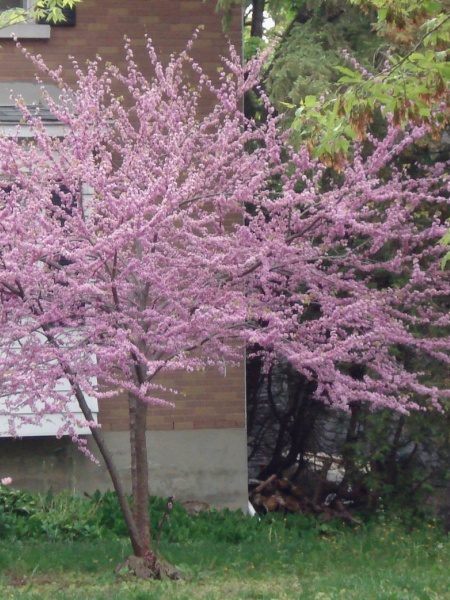
Source: Sundaura Alford-Purvis
Cercis canadensis
Eastern Redbud
Gainier rouge
Synonyms
Canada redbud
No seeds available for this plant.
We currently accept seeds for this plant
Bloom Colour: Pink
Bloom Period: Apr - Apr
Max Height: 30.0 feet
Max Width: 35.0 feet
Light Condition:
 More than 6 hours of direct sun a day
More than 6 hours of direct sun a day
 More than 2 or 3 hours but less than 6 hours of direct sun a day
Soil conditions:
More than 2 or 3 hours but less than 6 hours of direct sun a day
Soil conditions:
 Tolerates dry soil condition
Tolerates dry soil condition
 Tolerates medium soil condition
Tolerates medium soil condition
 More than 6 hours of direct sun a day
More than 6 hours of direct sun a day
 More than 2 or 3 hours but less than 6 hours of direct sun a day
More than 2 or 3 hours but less than 6 hours of direct sun a day
 Tolerates dry soil condition
Tolerates dry soil condition
 Tolerates medium soil condition
Tolerates medium soil condition
Lifespan:
Perennial
plants that will that come back year after year
Plant is
dioecious
Need a male and female plant to produce seeds
Gardener Experience:
 Does not spread uncontrollably
Does not spread uncontrollably
 Easy to germinate
Easy to germinate
 Self-seeding
Self-seeding
 Does not spread uncontrollably
Does not spread uncontrollably
 Easy to germinate
Easy to germinate
 Self-seeding
Self-seeding
Landscape Uses:
No landscape information available.
Ecological Benefits:
 Supports pollinators
Supports pollinators
 Fixes nitrogen in the soil
Fixes nitrogen in the soil
 Supports pollinators
Supports pollinators
 Fixes nitrogen in the soil
Fixes nitrogen in the soil
Tolerates:
 Tolerates foot traffic around the plant
Tolerates foot traffic around the plant
 Tolerates limestone conditions
Tolerates limestone conditions
 Tolerates sandy conditions
Tolerates sandy conditions
 Tolerates juglone conditions
Tolerates juglone conditions
 Tolerates foot traffic around the plant
Tolerates foot traffic around the plant
 Tolerates limestone conditions
Tolerates limestone conditions
 Tolerates sandy conditions
Tolerates sandy conditions
 Tolerates juglone conditions
Tolerates juglone conditions
Special Features and Considerations:
 This plant is endangered
This plant is endangered
 This plant causes skin rashes
This plant causes skin rashes
 This plant is endangered
This plant is endangered
 This plant causes skin rashes
This plant causes skin rashes
Ecological Benefits
Butterflies Supported by Cercis canadensis
- Automeris io (Io moth)
- Callophrys henrici (Henry's Elfin)
Specialized Bees Supported by Cercis canadensis
No bee data available for this plant.
Plants that grow in similar conditions, that bloom at the same time.
Complementary Plants
- No complementary plants found.
Substitute For Non-Native Plants
- Magnoliaceae (Magnolia)
- Forsythieae (Forsythia)
Sowing Information
Download Seed Envelope Labels (PDF)
- Sowing depth: Sow just below surface
- Sow by February
- Stratification duration: 60 days
- Self-seeding
- Notes: Soak in hot water 24h.
Harvesting and Seed Sharing
- Harvest start month: October
- Harvesting indicator:
- Pods are brown and slightly open
- Harvesting:
- Open the pod, remove seeds
- Seed viability test:
- No test needed before donating
- Packaging measure: Six (6) seeds (eyeball)
- Seed storage:
- Air dry in paper bag or open container, for a few days until crisp
- Shake seeds to move them once in a while to prevent molding
- Cultivar: Yes, do not donate unless you know source, and there are no known cultivars in your garden or at proximity
- No harvesting video available at this time.
Toxicity Notes
Not known to be toxic to mammals if ingested.


